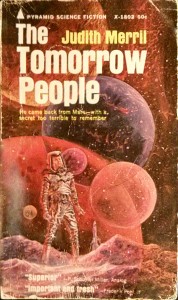Damon Knight’s 1967 review sums it up well when he says, “parts of this book are relatively painless to read”. He also notes that the story contains an “unaccountable sprinkling of 1960 jive talk” and seems to be written from what he describes as the 1960s “woman’s-magazine viewpoint”.
It’s not a terrible book and it actually became slightly interesting towards the end. The story purports to be about the mystery of astronaut Johnny Wendt, the only surviving human from the first expedition to Mars, a man who has lost his memory and doesn’t know why he survived. The story is actually about Lisa Trovi, the woman who has made it her job to take care of Johnny, and their endless relationship problems. Johnny gets drunk, Johnny acts like a jerk, Johnny won’t cooperate with the scientists and politicians who need help putting together a second expedition to Mars, Johnny wanders off and feels sorry for himself, Johnny gets into fights, Johnny becomes unnecessarily jealous of Lisa.
Lisa has to pick up the pieces every time Johnny screws something up. About 75% of the novel is Johnny and Lisa sorting out their problems and is fairly boring stuff. The remaining 25% of the novel deals with scientist Phil Kutler who, with Lisa’s assistance, has to find out what happened on Mars. This leads to an eventual trip for the two of them to a lunar base where they study a vat of growing gray goo that came back from Mars with Johnny. The scientists keep pumping in their best guess at nutrients and the gray goo keeps bubbling and growing. Lisa is immediately fascinated by the goo and soon begins spending all her time sitting and staring at it.
Readers with even the slightest familiarity with science fiction will solve the mystery long before Lisa and Phil grok what’s going on. The gray goo is a piece of the single Martian biological consciousness and it has developed a psionic bond with Lisa because of some peculiar quirk about her brain. Using her brain as a conduit it begins reaching out to other minds on the moonbase. As the link grows stronger Lisa finally realizes what’s happening and makes conscious first contact with the Martian goo-brain. We get a brief but moderately amusing snippet of Martian-brain-speak. Here’s a sample:
“I-all, ready now, knowing from last time, from Earth-other-brothers who came in first great ship, knowing ahead this time: air, water vapor – without these the Earth-bodies cannot survive; old memories stirring, from before me-all, once on a time when the I-we who lived before me-all were discrete bodies alive in a fluid of water-air; back, distant-far back before the drying and thinning of atmosphere…”
You get the idea, the Martian goo had tried to communicate with the first astronauts without understanding they were discrete beings and things went all wrong. It was just a big misunderstanding and everyone wants to be friends now. If all the annoying Johnny/Lisa soap-opera sections could be excised, I think this would make a pretty good short story. If you like old science fiction and happen across the book, you might enjoy it. But I wouldn’t recommend going out of your way to find it.
Judith Merril is probably better known by modern science fiction fans by her pseudonym Cyril Judd, used for short stories co-authored with C. M. Kornbluth. She’s also known for introducing Canadian broadcasts of Doctor Who from 1978 to 1981. Her short (five minutes or so) introductions usually included an interesting contemplation of the theme of the episode about to be shown. She also gained brief notariety outside the science fiction world when, in the 1970s, she dressed up as a witch, travelled to Ottawa and cast a hex on the Canadian Parliment for allowing tests of American cruise missiles over Canada.

